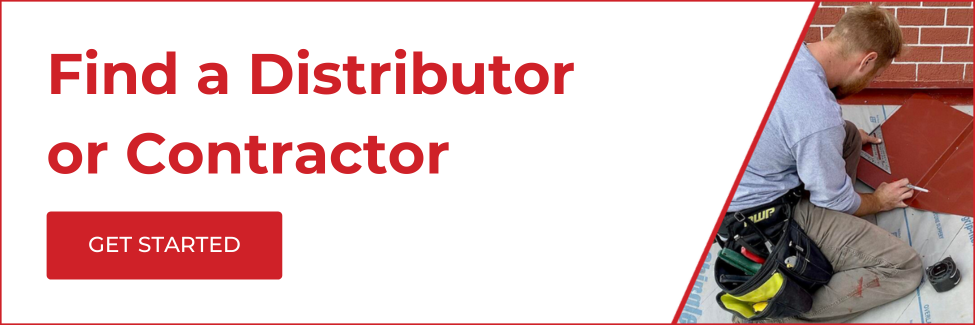Through-Fastened vs. Standing Seam Metal Roofing: A Comparison
Metal roofing has become increasingly popular as a durable and long-lasting roofing option. Two of the most common types of metal roofing are exposed-fastened and concealed-fastened (standing seam) roofing.
Both options have pros and cons, so it's important to understand the differences between them to choose the best one for your needs. In this blog post, we compare and contrast exposed-fastened metal roofing to standing seam metal roofing to help you make an informed decision.
Exposed-Fastened Metal Roofing
Exposed-fastened, also known as through-fastened metal roofing, or screw-down metal roofing, is a traditional roofing method where the panels are attached to the roof deck or purlins with screws driven through the panels and into the substructure. The screws include a metal cap and washer, which together provide a secure, weather-tight seal. This type of roofing is relatively easy to install and is less expensive than standing seam roofing.
One of the biggest advantages of exposed-fastened metal roofing is its cost-effectiveness. Since the panels attach with screws directly through the face, the installation process tends to be quicker. This panel style typically boasts a wider cover width (often twice as wide as standing seam panels), reducing labor costs. Exposed-fastened metal roofing is available in a variety of profiles and colors, providing residential and commercial building owners with plenty of options.
One of the main drawbacks of exposed-fastened metal panels is that the hole around the screw can enlarge over time due to the metal roof panels' expansion and contraction with temperature changes. While this phenomenon is rare in panels below 30′, it can become more likely on longer-length panels. If needed, it's commonly remedied by installing an appropriately sized replacement fastener and oversized washer to cover the slotted hole.
Popular McElroy Metal Exposed-Fastener Panels
- R-Panel — Versatile exposed-fastened panel with a 1¼″ rib height; used for walls and roofs in commercial, industrial, and residential projects.
- U-Panel — Wall and roof panel with ~¾″ rib height and 6″ on-center rib spacing; lower profile and softer appearance than R-Panel or Multi-Rib.
- Max-Rib — Features a ¾" rib height, offering an economical and durable roofing and wall solution for residential, agricultural, and light commercial applications.
- Multi-Cor — Corrugated exposed-fastened panel with consistent rounded corrugations; suitable for walls, roofs, or interior accents.
- Mesa — Exposed-fastened panel featuring a ¾″ rib height; suitable for agricultural, residential, and light commercial applications.
Click here for a complete list of McElroy Metal's Exposed-Fastener Panels.
Standing Seam Metal Roofing
Standing seam systems use concealed fasteners. Panels attach to the substructure with clips or a pre-punched fastening flange that allows for thermal movement. These systems are generally more expensive but offer sleek aesthetics, robust, long-term performance, and remove the slotting concern around fasteners that can be problematic for exposed-fastened systems.
Popular McElroy Metal Standing Seam Systems
- Maxima (family, incl. Maxima ADV) — Mechanically seamed vertical-leg standing seam panels offered in multiple leg heights; curving options available.
- 138T & 238T — Symmetrical, mechanically seamed standing seam systems; offer patented recover solutions and high performance for reroof/retrofit.
- Meridian — Snap-together clipless standing seam panel with ~0.91″ height; concealed fastener design that is economical and easy to install.
- Medallion-Lok — Snap-together architectural standing seam panel with a rigid ~1.75″ standing seam and hidden clips.
- MasterLok-90 — Snap-together trapezoidal standing seam system designed for roof slopes as low as 1/4:12.
- MasterLok-FS — Mechanically seamed trapezoidal standing seam system designed for roof slopes as low as 1/4:12.
Click here for a complete list of McElroy Metal's Standing Seam Systems.
Which One Should You Choose?
The choice between exposed-fastened and concealed-fastened standing seam metal roofing ultimately comes down to your budget, desired aesthetic, desired level of maintenance, and location. If you're looking for a cost-effective roofing option and don't mind a traditional look, exposed-fastened metal roofing may be the best choice.
However, if you're willing to invest more money upfront, standing seam metal roofing may be the better choice. Both options can provide long-lasting protection for your home or business when properly selected and installed.
Quick Comparison Guide
| Feature | Exposed-Fastened Systems | Standing Seam Systems |
|---|---|---|
| Installation Cost | Lower (more economical) | Higher (more complex installation) |
| Panel Movement | Limited flexibility; fastened through the panel | Allows thermal movement via clips or slotted flanges |
| Aesthetic Appeal | Traditional look; visible fasteners | Sleek, modern appearance; concealed fasteners |
| Ideal For | Agricultural, residential, light commercial | Commercial, institutional, retrofit |
| Example Products | R-Panel, U-Panel, Max-Rib, Multi-Cor, Mesa, Multi-V | Maxima, 138T/238T, Meridian, Medallion-Lok, MasterLok-90/FS |
Final Thoughts
Whether you're designing a new building or upgrading an existing roof, McElroy Metal's diverse line of exposed-fastened and concealed fastened standing seam systems ensures you'll find the perfect fit for your project. Each panel is engineered for durability, performance, and aesthetic appeal, supported by more than 60 years of innovation and customer commitment. Partner with McElroy Metal to get the strength, style, and service your next roofing project deserves.
About McElroy Metal
Since 1963, McElroy Metal has served the construction industry with quality products and excellent customer service. The employee-owned components manufacturer is headquartered in Bossier City, La., and has 14 manufacturing facilities across the United States. Quality, service and performance have been the cornerstone of McElroy Metal’s business philosophy and have contributed to the success of the company through the years. As a preferred service provider, these values will continue to be at the forefront of McElroy Metal’s model along with a strong focus on the customer.









Comments on this article:
Scroll down to the bottom to submit a comment and join the conversation. Need help or have a question? Please contact us. Looking for a distributor or contractor? Please click here to get started.